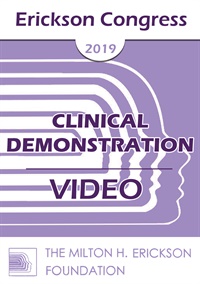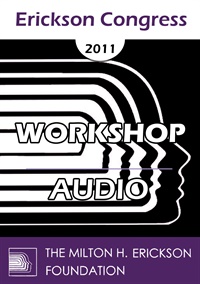
- Average Rating:
- Not yet rated
- Topic Areas:
- Trauma | Workshops | Pain and Healing | Somatic Experiences | Energy Psychology | Mindfulness | Neuroscience | Ericksonian Hypnosis and Therapy Techniques | Psychology
- Categories:
- Erickson Congress | Erickson Congress 2011
- Faculty:
- Maggie Phillips, PhD
- Duration:
- 59 Minutes
- Format:
- Audio Only
- Original Program Date:
- Dec 07, 2011
- Short Description:
- The single reason most people don’t recover from pain is related to unresolved trauma. This workshop will present efficient, effective ways to develop cooperative partnership with somatic experience to create lasting comfort, balance in the nervous system, and healing of past trauma. Techniques are drawn from , neuroscience, Somatic Experiencing,™ Ericksonian principles, mindfulness, and Energy Psychology to provide a cohesive, multi-modal approach.
- Price:
- $20.00 - Base Price
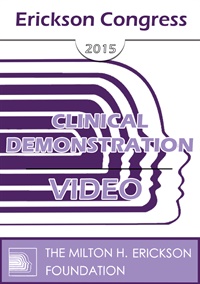
- Average Rating:
- Not yet rated
- Topic Areas:
- Clinical Demonstrations | Pain and Healing | Mind-Body | Polyvagal Theory
- Categories:
- Erickson Congress | Erickson Congress 2015
- Faculty:
- Maggie Phillips, PhD
- Course Levels:
- Master Degree or Higher in Health-Related Field
- Duration:
- 01:04:00
- Format:
- Audio and Video
- Original Program Date:
- Dec 10, 2015
- Short Description:
- This demonstration illustrates how clients can be taught to regulate persistent or chronic pain using simple strategies such as circular breathing, work with pendulum rhythms, voluntary and involuntary movement, and prosodic toning. Discussion will emphasize how these and other tools can activate or modulate specific aspects of polyvagal functioning to restore balance and bring relief.
- Price:
-
Sale is $29.00
price reduced from Base Price - $59.00
Tags: Mind-Body Pain & Healing Polyvagal
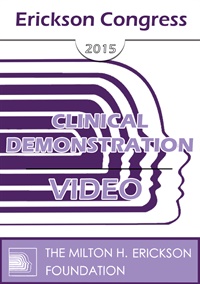
- Average Rating:
- Not yet rated
- Topic Areas:
- Clinical Demonstrations | Hypnosis | Trauma | Psychology | Pain and Healing | Energy Psychology | Ericksonian Hypnosis and Therapy Techniques
- Bundle(s):
- Learning Track - Using Hypnosis
- Categories:
- Erickson Congress | Erickson Congress 2015
- Faculty:
- Robert Schwarz, PsyD
- Course Levels:
- Master Degree or Higher in Health-Related Field
- Duration:
- 01:01:00
- Format:
- Audio and Video
- Original Program Date:
- Dec 12, 2015
- Short Description:
- Multilevel communication was important to Erickson. In this demonstration we will use “energetic communication”. Energy Psychology (EP) approaches will be integrated within an Ericksonian framework to treat a traumatic event; first focusing on neutralizing the negative affect of the trauma with EP and then increasing positive resources and connections with Ericksonian Hypnosis.
- Price:
-
Sale is $29.00
price reduced from Base Price - $59.00
- Average Rating:
- Not yet rated
- Topic Areas:
- Clinical Demonstrations | Mind-Body | Pain and Healing | Yes Set
- Categories:
- Erickson Congress | Erickson Congress 2019
- Faculty:
- Jeffrey Feldman, PhD
- Course Levels:
- Master Degree or Higher in Health-Related Field
- Duration:
- 58 Minutes
- Format:
- Audio and Video
- Original Program Date:
- Dec 15, 2019
- Short Description:
- Individuals are often referred for mind-body oriented pain management services concerned that the referring physician thinks that their pain is not real or that it is “all in my head”. The way in which such concerns are addressed and the relationship between mind and body is explained to patients will be demonstrated.
- Price:
-
Sale is $29.00
price reduced from Base Price - $59.00
Tags: Mind-Body Pain & Healing Yes Set

- Average Rating:
- Not yet rated
- Topic Areas:
- Short Courses | Pain and Healing | Language of Hypnosis
- Categories:
- Erickson Congress | Erickson Congress 2019
- Faculty:
- Rachel Hott, PhD
- Duration:
- 1 Hour 7 Minutes
- Format:
- Audio Only
- Original Program Date:
- Dec 12, 2019
- Short Description:
- How often do we notice our pain, and not our comfort?! Most people only notice pain. When we pay attention to the "sensation," of pain we have a vocabulary that goes from A-Z to explain what we are feeling. For example, aching, biting, caustic, etc. However, when people think about the sensation of comfort, or attempt to describe how they are feeling without pain, they do not have descriptive language except for adjectives.
- Price:
- $15.00 - Base Price
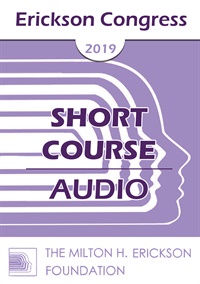
- Average Rating:
- Not yet rated
- Topic Areas:
- Short Courses | Pain and Healing | Tailoring | Trauma
- Categories:
- Erickson Congress | Erickson Congress 2019
- Faculty:
- James Keyes, PhD
- Duration:
- 1 Hour 32 Minutes
- Format:
- Audio Only
- Original Program Date:
- Dec 12, 2019
- Short Description:
- During this presentation, the development of chronic pain syndromes and some practical interventions will be discussed. Specifically, assessing patient's current functioning within a "whole-person approach" will allow clinicians better information about where to begin assisting with change. While using the "evidence-based treatments" as a starting point, finding ways to tailor the intervention to the individual will be reviewed. We will honor the long-history of hypnosis being used to treat chronic pain. Finally, we will review outcome research indicating what seems to make the most effect for patients with pain.
- Price:
- $15.00 - Base Price
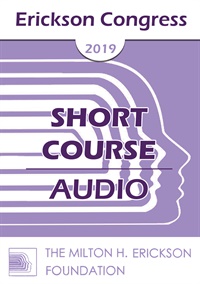
- Average Rating:
- Not yet rated
- Topic Areas:
- Short Courses | Pain and Healing | Therapeutic Relationship | Ericksonian Hypnosis and Therapy Techniques
- Categories:
- Erickson Congress | Erickson Congress 2019
- Faculty:
- Virgil Hayes, DO
- Duration:
- 1 Hour 27 Minutes
- Format:
- Audio Only
- Original Program Date:
- Dec 12, 2019
- Short Description:
- Chronic pain is frequently encountered by healthcare professionals. The current treatment is primarily pharmaceutical intervention with Opioids or NSAIDS that create new problems and address a limited part of the pain. Pain, whether physical or mental/emotional, tends to be experienced as one. Anticipated pain and memories of past painful incidents also contribute to the experience of pain.
- Price:
- $15.00 - Base Price
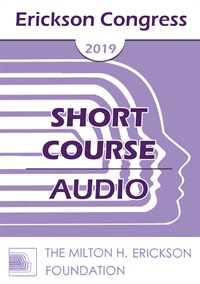
- Average Rating:
- Not yet rated
- Topic Areas:
- Short Courses | Metaphors | Storytelling | Ericksonian Hypnosis and Therapy Techniques | Pain and Healing
- Categories:
- Erickson Congress | Erickson Congress 2019
- Faculty:
- Marta Nowak-Kulpa, MA Psychologist
- Duration:
- 1 Hour 23 Minutes
- Format:
- Audio Only
- Original Program Date:
- Dec 12, 2019
- Short Description:
- This workshop will teach participants skills in using metaphors and stories to help patients experience a deep contact with themselves so that they can survive and even thrive following life-changing surgery. The material will focus on Ericksonian approaches that help patients heal, experience comfort, and restore body homeostasis. Clinical examples from patients undergoing transplantation – including face transplantation – will be presented. Face transplants are extremely complex and relatively rare. They usually require many months and even years of preparation.
- Price:
- $15.00 - Base Price
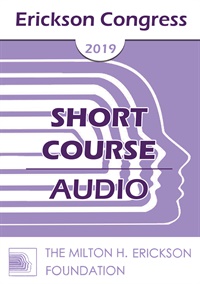
- Average Rating:
- Not yet rated
- Topic Areas:
- Short Courses | Pain and Healing | Sex and Sexuality | Multicultural | Psychotherapy
- Categories:
- Erickson Congress | Erickson Congress 2019
- Faculty:
- Mitra Rashidian, PhD | Robert Jaffe, PhD, LMFT
- Duration:
- 1 Hour 27 Minutes
- Format:
- Audio Only
- Original Program Date:
- Dec 12, 2019
- Short Description:
- According to research (Rashidian et al. 2015), Genito-Pelvic Pain/Penetration Disorder ‘Vaginismus’, causes significant sexual challenges for groups of sub-population women in the US. This workshop provides raw data and statistical analysis, supporting the hypothesis that these women experienced sexual pain as a manifestation of biopsychosocial conditions, resulting from cultural orientations. These include the cultural do’s and don’ts that shapes sub-population women’s sexual beliefs and attitudes, as a result of their life experiences within their cultures, impacting emotional and physical sexual experiences negatively.
- Price:
- $15.00 - Base Price
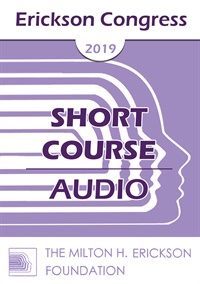
- Average Rating:
- Not yet rated
- Topic Areas:
- Short Courses | Ericksonian Hypnosis and Therapy Techniques | Pain and Healing | Research | Hypnosis
- Categories:
- Erickson Congress | Erickson Congress 2019
- Faculty:
- José Cava, Lic Psychologist
- Duration:
- 1 Hour 25 Minutes
- Format:
- Audio Only
- Original Program Date:
- Dec 12, 2019
- Short Description:
- Milton H. Erickson was a pioneer in understanding and managing chronic pain, even in his own life. He developed a variety of original and very effective hypnotic approaches to deal with pain. Acute pain is different from chronic pain, as recent research shows. The persistent of pain causes changes that permanently alter various areas in the brain and their communications. Chronic pain does not respond well to typical acute pain treatments and should be approached differently, with a more global and integrated approach.
- Price:
- $15.00 - Base Price
Please wait ...


